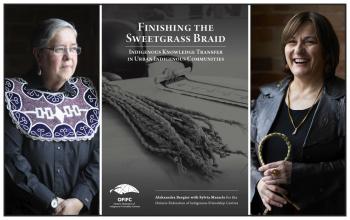Image Caption
Summary
Local Journalism Initiative Reporter
Windspeaker.com
Officials with the Ontario Federation of Indigenous Friendship Centres (OFIFC) have documented their work in the past.
But the group, which represents 29 friendship centres in cities and towns across Ontario, is showcasing its accomplishments in a new way.
Finishing The Sweetgrass Braid was introduced during a virtual book launch on Wednesday March 30.
The book is a collection of knowledge and teachings from the friendship centre movement. It details what Indigenous knowledge is passed down, its importance for future generations and how it is shared through urban Indigenous communities.
Finishing The Sweetgrass Braid is the result of a multi-year research project that was funded by the Social Sciences and Humanities Research Council (SSHRC).
Sylvia Maracle, one of the book’s authors, served as the executive director of the OFIFC for 42 years before retiring last year.
Maracle said the federation has documented information in the past.
“But it’s the only time we pursued a research grant to do it,” she said. “And if you go way back in the history of friendship centres and urban development, you’ll find that we were always doing things from a cultural perspective. We just didn’t realize it was a cultural perspective and we couldn’t articulate it as one.”
Putting the federation’s work into book form was a natural step.
“This was a logical conclusion for us, that we had the opportunity to say in a bigger way and in a different venue to actually publish things,” Maracle said. “And there are two thoughts whether we should document this stuff and share it with the world.
“It used to be, when we got traditional teachings, we weren’t allowed to take notes. But we’ve come a long way saying we don’t have enough traditional teachers and we have to get the messages out there.”
Gertie Mai Muise, OFIFC’s chief executive officer, said it was way back in October 2013 that the federation applied for a SSHRC grant. The application was requested to fund a project about Indigenous knowledge transfer in urban Aboriginal communities.
The project included the creation of the book.
Muise said the book is unique as it’s the first one about friendship centres and urban Indigenous knowledge transfer.
“The book reveals how this work is about the people and a search that knowledge transfer lives within our communities through every day good living,” Muise said. “The book is a culmination of the care and effort by many people who have come together to preserve Indigenous ways of being, knowing and doing.”
Muise said it’s also enlightening for another reason.
“The book demonstrates how there is a place for everyone within the circle, how you can go different places carrying your bundles and come back to the movement picking up new roles and responsibilities as we go,” she said.
Aleksandra Bergier, a research advisor in Indigenous initiatives at Queen’s University in Kingston, Ont., co-authored the book.
“I think the book also speaks to the kindness and generosity of the knowledge keepers and community members who decided this is the right time to share some of this wisdom more broadly with the world,” Bergier said.
“And the book is full of quotes from Elders and it is full of stories about people who are beloved teachers in the friendship centre movement.”
The OFIFC was founded in 1971. Friendship centres are locations where Indigenous people living in urban spaces can gather and connect with the larger Indigenous community and receive culturally based services.
Muise is thrilled a book about the OFIFC was published.
“Finishing the Sweetgrass Braid is a window into the passionate work of generations of urban First Nation, Inuit and Métis people, our families, our communities, and their efforts in restoring and redefining the interconnectedness of physical, mental, emotional and spiritual wellbeing of urban Indigenous peoples,” she said.
Muise said she’s also pleased with the book’s contents.
“The knowledge shared in this special writing is a sacred gift and blessing,” she said. “It’s a heartfelt testimony to the ongoing dedication to the wellbeing of urban Indigenous communities within the friendship centre movement.”
Maracle is also ecstatic the OFIFC now has a legacy book.
“This work is a profoundly significant contribution to the renaissance and legacy of Indigenous knowledge,” she said. “Like the strands in a sweetgrass braid, each person along the path helped make our bundle. We are grateful and honour those who shared these invaluable gifts. Now that the fire has been rekindled, we will continue to tend to it so that our communities can grow and thrive.”
The book can be pre-ordered now at https://goodminds.com/products/finishing-the-sweetgrass-braid
Local Journalism Initiative Reporters are supported by a financial contribution made by the Government of Canada.

